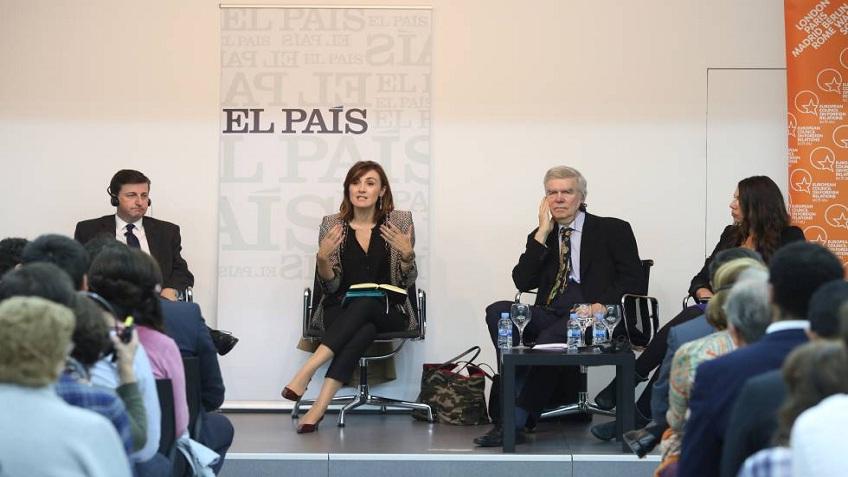News
Europa en ‘Brexit’, Europa en crisis
14-11-2016

Douglas Alexander (Glasgow, 1967), who served as British Minister of State for Europe under Tony Blair, is concerned about what’s going on in Theresa May’s head: "Not even she knows what she means when she speaks of Brexit," said the politician, who says he’s skeptical whether his country’s government has any plan beyond breaking with the European Union, scheduled for before March 2017. "Brexit means brexit' is a way of saying: I have no idea what it means,” added the veteran British diplomat Robert Cooper (Essex, 1947), who joined his Labour colleague for the debate Europe in Brexit, Europe in crisis, organized on Thursday by EL PAÍS and The European Council on Foreign Relations (ECFR) at the Círculo de Bellas Artes in Madrid.
"They know neither what their negotiation strategy should be, nor where they want to go," said Alexander, who welcomed the ruling that the activation of Article 50 of the Treaty of Lisbon must go before Parliament, which will probably delay the start of the process. Much has changed in continental Europe since Alexander was in government ten years ago – before the economic crisis and the rise of populist movements in the West. "What’s behind the rise of Trump in the United States is very similar to what has happened in the United Kingdom with Brexit," said the politician, for whom forces such as uncertainty and social alienation are behind the populist phenomenon.
Even before the divorce from the EU becomes final, Cooper says the negative consequences of Brexit are already being felt. "The immediate impact on the British economy is that we will all be poorer. The pound has fallen by 15%, so we are 15% poorer," said the diplomat, who was an adviser to, Javier Solana and Catherine Ashton at The European Council on Foreign Relations (ECFR).
"I think the negotiations are going to be very tough," said Alexander, who agreed with Cooper that two years – as set out by European regulations – will not be enough to reach a definitive agreement with the 27 EU member states. "We need an interim agreement," said the former minister, who pointed out that a simpler agreement – the CETA with Canada – has been subject to seven years of negotiations. "I can’t imagine being able to close an agreement like the one that was closed with Canada by spring 2019.
Alexander also criticized the language used by the UK Government when referring to Brexit. "When they say border control they mean ending to the right to the free movement of people in the United Kingdom," he said, referring to one of the elements that May considers essential to the process of breaking ties with the EU, even at the cost of limiting access to the single market. "Brexit is not going to put an end this feeling of fear, nor the anti-immigration, anti-establishment mood," noted EL PAÍS ‘s International Editor, María R. Sahuquillo, who also participated in the event. "That mood may even turn against the British Government itself after they leave," she said.
Both Alexander and Cooper pointed to the disconnect between the European Union and British voters as a cause of the referendum outcome, on June 23. "In the United Kingdom, Europe wasn’t a feeling, it was an idea," said Cooper of the widespread lack of emotional attachment to the common European project. On the possibility that the process might be halted by Parliament or of a second referendum, Cooper said: "Right now, anything is possible in the UK. We are in uncharted territory." Even so, he jokingly dismissed this method as a desirable solution to issues affecting voters, judging by recent examples such as that of his country or that of the peace deal in Colombia. "I’d say there should be no other referendum, anywhere else in the world. Referendums are the work of the devil!."
It may interest you



